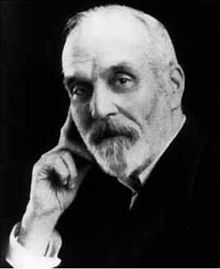- Henry Dudeney
-
Henry Dudeney 
Born Henry Ernest Dudeney
10 April 1857
Mayfield, East Sussex, EnglandDied 23 April 1930 (aged 73)
Lewes, Sussex, EnglandCause of death Throat cancer Known for Puzzles, Mathematical games Henry Ernest Dudeney (10 April 1857–23 April 1930) was an English author and mathematician who specialised in logic puzzles and mathematical games. He is known as one of the country's foremost creators of puzzles. His last name is pronounced with a long "u" and a strong accent on the first syllable, as in "scrutiny".[1]
Contents
Early life
Dudeney was born in the village of Mayfield, East Sussex, England. His grandfather, John Dudeney, was well known as a self-taught mathematician and shepherd; his initiative was much admired by his grandson. Dudeney learned to play chess at an early age, and continued to play frequently throughout his life. This led to a marked interest in mathematics and the composition of puzzles. Chess problems in particular fascinated him during his early years.


Career
Although Dudeney spent his career in the Civil Service, he continued to devise various problems and puzzles. Dudeney's first puzzle contributions were submissions to newspapers and magazines, often under the pseudonym of "Sphinx." Much of this earlier work was a collaboration with American puzzlist Sam Loyd; in 1890, they published a series of articles in the English penny weekly Tit-Bits.
Dudeney later contributed puzzles under his real name to publications such as The Weekly Dispatch, The Queen, Blighty, and Cassell's Magazine. For twenty years, he had a successful column, "Perplexities", in the magazine The Strand, edited by the former editor of Tit-Bits, George Newnes. Dudeney continued to exchange puzzles with fellow recreational mathematician Sam Loyd for a while, but broke off the correspondence and accused Loyd of stealing his puzzles and publishing them under his own name.
Some of Dudeney's most famous innovations were his 1903 success at solving the Haberdasher's Puzzle (Cut an equilateral triangle into four pieces that can be rearranged to make a square) and publishing the first known crossnumber puzzle, in 1926. In addition, he has been credited with inventing verbal arithmetic and discovering new applications of digital roots.
Personal life
In 1884 Dudeney married Alice Whiffin (1864–1945). She later became a very well known writer who published many novels as well as a number of short stories in Harper's Magazine under the name "Mrs. Henry Dudeney". In her day, she was compared to Thomas Hardy for her portrayals of regional life. The income generated by her books was important to the Dudeney household, and her fame gained them entry to both literary and court circles.
After losing their first child at the age of four months in 1887, the Dudeneys had one daughter, Margery Janet (1890–1977). She married (John) Christopher Fulleylove, son of John Fulleylove and one of an esteemed family of English artists. The Fulleyloves emigrated to North America, first living in Canada and eventually settling first in Oakland, Michigan, and later New York. They had three sons: John Gabriel (died in infancy), James Shirley, and Julian John ("Barney"); and two daughters: Catherine and Elizabeth Ann ("Nancy").
Alice's personal diaries were edited by Diana Crook and published in 1998 under the title A Lewes Diary: 1916–1944. They give a lively picture of her attempts to balance her literary career with her marriage to her brilliant but volatile husband.
In April 1930, Dudeney died of throat cancer in Lewes, where he and his wife had moved in 1914 after a period of separation to rekindle their marriage. Alice Dudeney survived him by fourteen years and died on 21 November 1945, after a stroke. Both are buried in the Lewes town cemetery. Their grave is marked by a copy of an 18th century Sussex sandstone obelisk, which Alice had copied after Ernest's death to serve as their mutual tombstone.
In addition to puzzles, Dudeney had hobbies including billiards, bowling, and especially croquet. He was a skilled pianist and organist, interested in ancient church music and plainsong. Dudeney was a devout Anglican who regularly attended services, studied theology, and on occasion wrote tracts defending church positions.
Publications
- The Canterbury Puzzles (1907)
- Amusements in Mathematics (1917)
- The World's Best Word Puzzles (1925)
- Modern Puzzles (1926)
- Puzzles and Curious Problems (1931, posthumous)
- A Puzzle-Mine (undated, posthumous)
See also
References
- ^ Dudeney, Henry Ernest. "536 Puzzles and Curious Problems". EBOOKEE. http://ebookee.org/Henry-Ernest-Dudeney-536-Puzzles-and-Curious-Problems_836042.html. Retrieved 25 September 2011.
- Gardner, Martin (1995), 536 Curious Problems & Puzzles: Introduction, Barnes & Noble Books, ISBN 1-56619-896-8
External links
- Works by Henry Ernest Dudeney at Project Gutenberg
- The Haberdasher Puzzle
- O'Connor, John J.; Robertson, Edmund F., "Henry Dudeney", MacTutor History of Mathematics archive, University of St Andrews, http://www-history.mcs.st-andrews.ac.uk/Biographies/Dudeney.html.
- [1]
Categories:- 1857 births
- 1930 deaths
- British chess players
- English chess players
- English Anglicans
- People from Mayfield, East Sussex
- Puzzle designers
- Cancer deaths in England
- Deaths from esophageal cancer
- 19th-century mathematicians
- 20th-century mathematicians
Wikimedia Foundation. 2010.
